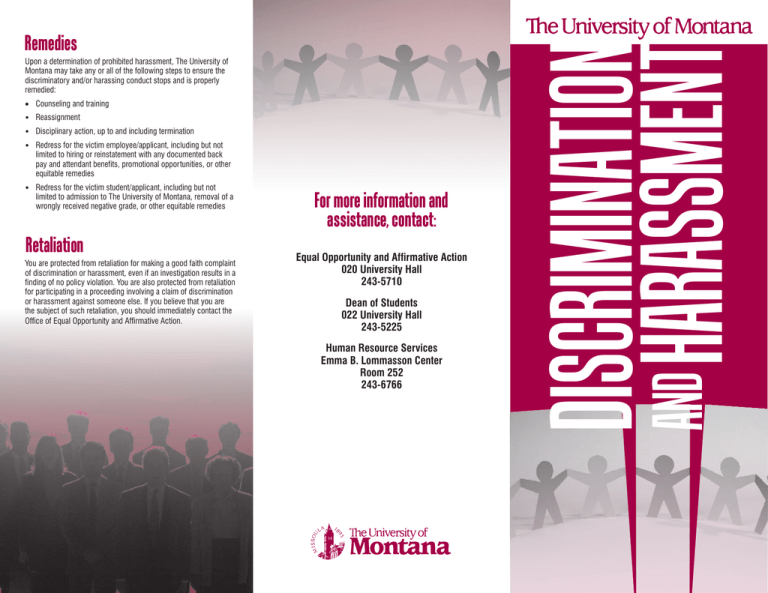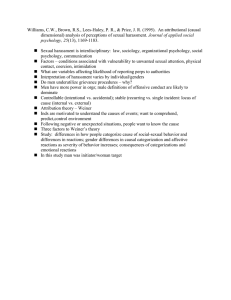
Upon a determination of prohibited harassment, The University of
Montana may take any or all of the following steps to ensure the
discriminatory and/or harassing conduct stops and is properly
remedied:
• Counseling and training
• Reassignment
• Disciplinary action, up to and including termination
• Redress for the victim employee/applicant, including but not
limited to hiring or reinstatement with any documented back
pay and attendant benefits, promotional opportunities, or other
equitable remedies
• Redress for the victim student/applicant, including but not
limited to admission to The University of Montana, removal of a
wrongly received negative grade, or other equitable remedies
Retaliation
You are protected from retaliation for making a good faith complaint
of discrimination or harassment, even if an investigation results in a
finding of no policy violation. You are also protected from retaliation
for participating in a proceeding involving a claim of discrimination
or harassment against someone else. If you believe that you are
the subject of such retaliation, you should immediately contact the
Office of Equal Opportunity and Affirmative Action.
For more information and
assistance, contact:
Equal Opportunity and Affirmative Action
020 University Hall
243-5710
Dean of Students
022 University Hall
243-5225
Human Resource Services
Emma B. Lommasson Center
Room 252
243-6766
Discrimination
and Harassment
Remedies
Equal Opportunity – Non-Discrimination
Other Forms of Harassment
What to Do
The University of Montana provides to all people the equal opportunity
for education, employment, and participation in University activities
without regard to race, color, religion, national origin, creed, service in
the uniformed services (as defined in state and federal law), veteran
status, sex, age, political ideas, marital or family status, physical or
mental disability, or sexual orientation. Responsibility for effecting
equal opportunity accrues to all University administrators, faculty,
and staff. This responsibility includes assurance that employment and
admission decisions, personnel actions, and administration of benefits
to students and employees rest exclusively upon criteria that adhere to
the principle of Equal Opportunity. The University prohibits retaliation
against a person for bringing a complaint of prohibited discrimination,
for assisting someone with a complaint of discrimination, or for
participating in any manner in an investigation or resolution of a
complaint of discrimination.
Harassment based on age, color, disability, marital/family status,
national origin, political ideas, race, religion, sex (including
pregnancy), creed, sexual orientation, or veteran status is prohibited
at The University of Montana.
It is important to identify and stop discriminatory and harassing
conduct as soon as it begins. If you believe that you may be
experiencing discriminatory harassment, you should take one
or more of the following actions as you deem appropriate to the
situation:
Sexual Harassment
The University of Montana provides a learning and working
environment that is free from sexual harassment. Sexual harassment is
strictly prohibited. This policy applies to all members of the University
community, including all employees and students. All members of the
University community are responsible to ensure that the University is
free from all forms of sexual harassment.
The following conduct is prohibited:
• Making unwelcome sexual advances or requests for sexual favors;
• Threatening an adverse employment or educational consequence
for failure to engage in sexual relations;
• Promising positive educational or employment-related favors in
exchange for sexual favors;
• Harassing a person based on gender.
The above conduct constitutes sexual harassment when it is
sufficiently severe or pervasive as to disrupt or undermine a
person’s ability to participate in or receive the benefits, services, or
opportunities of the University, including unreasonably interfering with
a person’s work or educational performance.
To be considered unlawful harassment, the conduct at issue must
create a hostile work or educational environment, and must be
directed at an individual because of his or her membership in one of
the above-listed protected classes.
The conduct comprising the hostile work or educational environment
must be sufficiently severe or pervasive. This means that the conduct
must unreasonably interfere with work or academic performance or
participation in University activities, or a reasonable person would
find the conduct sufficiently offensive. Generally, a few isolated
incidents do not rise to the level of an unlawful hostile work or
educational environment. It is the University’s goal and obligation
to end harassing behavior before it rises to the level of breaking the
law. The University will take immediate action to end the harassing
behavior, including appropriate disciplinary action, when instances of
harassment are identified and confirmed. Supervisors who knowingly
condone or fail to report incidents of harassment will themselves
be subject to discipline. Retaliation against persons who complain
about harassment or those who provide information about a claim of
harassment is also a violation of laws prohibiting discrimination and
will lead to disciplinary action against offenders.
Take Direct Action
Tell the harasser to stop. Speak up immediately and clearly state that
you are offended by the behavior and want it to stop.
Document all incidents, including dates, times, places, witnesses,
and descriptions of events.
Write a letter to the offender that identifies the offending behavior,
explains your feelings, and makes clear that you want the behavior to
stop. Keep a copy of the letter.
Seek Informal Assistance
If you are uncomfortable or fearful of taking direct action, or if
you have been unsuccessful in resolving the matter, discuss
your concerns with your academic advisor, appropriate dean or
department head, residence life assistant, director, or supervisor.
Contact Human Resource Services and staff will assist you with
informal resolution and/or provide mediation services.
If you feel uncomfortable discussing your concerns with
administrative or supervisory staff, or if the problems persist despite
attempts at resolution, you may speak in confidence with the Director
of Equal Opportunity. Speaking informally with the EO Director does
not automatically generate a formal complaint.
File a Complaint
You may file a complaint with the University in the Office of Equal
Opportunity and Affirmative Action, 020 University Hall. To the
extent possible, the University will protect the confidentiality of the
individuals bringing discrimination and harassment claims.
Whether conduct is sufficiently offensive to constitute sexual
harassment is determined from the perspective of an objectively
reasonable person of the same gender in the same situation.
If the complaint cannot be easily resolved, the EO Director will
conduct a prompt, thorough, and neutral investigation. The full
grievance procedure can be found online at www.umt.edu/eo.
The University will take appropriate measures to stop sexual
harassment, including disciplinary action. Retaliation against an
individual for reporting sexual harassment or for participating in an
investigation of a complaint of sexual harassment is strictly prohibited.
Discriminatory harassment of students by other students is also
addressed by certain provisions of the Student Conduct Code.
Complaints of this nature may be brought to the Dean of Students.
The University will discipline supervisors who knowingly condone or
fail to report or address instances of harassment.
Individuals should report sexual harassment to the Office of
Equal Opportunity and Affirmative Action in accordance with the
Discrimination Grievance Procedure.
You may contact a state or federal office authorized to receive
complaints of discrimination. The Office of Equal Opportunity and
Affirmative Action will provide information on how to contact those
offices.


